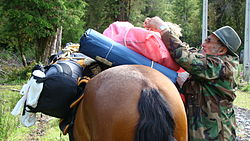- Arriero
-
An arriero loading a pack horse in southern Chile

An arriero is a person who transports goods using pack animals.
In South America, arrieros transport coffee, maize, cork, wheat, and myriad other items. They remain common in the paisa region (Antioquia and the Colombian Coffee-Growers Axis) of Colombia.
The fictional Juan Valdez, brand representative of the Federación Nacional de Cafeteros de Colombia, is an archetypal arriero carrying coffee sacks with this mule.
In English, an arriero is a form of muleteer, a wrangler of pack animals. In California, muleteers work out of pack stations.
In the Catalan language, an arriero is a traginer.
Contents
Origin
- The English word muleteer comes from the French muletier, from Old French, from mulet, diminutive of mul, mule.
- The Spanish word arriero is derived from the verb arrear that means to urge the cattle or other animals to walk. The verb itself is derived of 'arre', which is the call used to cry to the animals with this purpose.
- The Catalan word traginer comes from the Latin word tragīnare, a variant of tragĕre which means to transport.
Outfit
Typical arriero outfits vary from country to country: - *Alpargatas: Sandals, made of fique (natural fiber obtained of furcraea plants and leather.
- Poncho: Rectangular piece of fabric, usually white with linear embroided, that is used to protect the face and neck from the cold weather.
- Ruana: Square wool garment, larger than the poncho, with a hole in the middle for the head. It covers the torso.
- Tapapinche: Leather apron.
- Straw Hat (sombrero aguadeño)
- Machete
- Carriel: Leather bag traditionally made of nutria leather; nutria is a protected species now, so these bags are not used. It is used to carry personal goods and money. It has become an element of the Colombian fashion.
See also
- Igualada Muleteer's Museum
References and sources
Categories:- Colombian culture
- Personal care and service occupations
- Transport in Colombia
Wikimedia Foundation. 2010.


